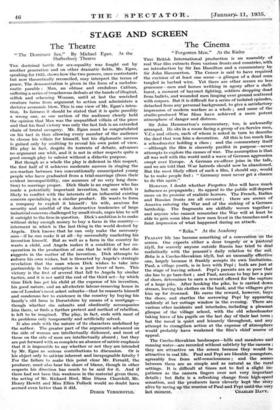STAGE AND SCREEN
The Theatre
" The Dominant Sex!' By Michael Egan. At the Shaftesbury Theatre THE doctrinal battle for sex-equality was fought out by another generation and on other dramatic fields. Mr. Egan, speaking for 1935, shows how the two powers, once contestants but now theoretically reconciled, may interpret the terms of peace. The demonstration is given in the form of a melodra- matic parable : Man, an obtuse and credulous Caliban, suffering a series of treacherous defeats at the hands of illogical, selfish and scheming Woman, until at last the wretched creature turns from argument to action and administers a decisive economic blow. This is one view of Mr. Egan's inten- tion. In fairness it should be stated that it is quite possibly a wrong one, as one section of the audience clearly held the opinion that Man was the unqualified villain of the piece and that his final victory was only the last link is an extended chain of brutal savagery. Mr. Egan must be congratulated on his tact in thus allowing every member of the audience to choose his villain for himself, but his diplomatic success is gained only by omitting to reveal his own point of view. His play in fact, despite its torrents of debate, advances no argument one whit, and it is not in other respects quite a good enough play to subsist without a didactic purpose.
But though as a whole the play is deficient in this respect, the first half of it achieves moderate success in staging the sex-warfare between two conventionally emancipated young people who have graduated from a trial-marriage (from their evident incompatibility, one assumes of no very long dura- tion) to marriage proper. Dick Shale is an engineer who has made a potentially important invention, but one which is likely to conflict with the interests of an influential existing concern specializing in a similar product. He wants to form a company to exploit it hiniself : his wife, anxious for security and mindful of the destructive tendencies of large industrial concerns challenged by small rivals, urges him to sell it outright to the firm in question. Dick's ambition is to make without delay enough money to buy a farm in the country— interment in which is the last thing in the world desired by Angela. Dick knows that he can 'only make the necessary sum—if he can make it at all—by successfully marketing his invention himself. But as well as a farm in the country he wants a child, and Angela makes it a condition of her co- operation in the production of one that he will do what she suggests in the matter of the invention. Dick attempts to enforce his own wishes, but is thwarted by Angela's strategic revelation that the man whom Dick wishes to take into partnership in the enterprise is a past lover of hers. This Victory is the first 'of several that fall to Angela by similar tactics, and it is not until the end of the third act—by. which time Dick has got his child at the expense of his invention, his good nature, and an all-electric labour-removing house in one of London's most select suburbs—that he reasserts himself and condemns her to existence in the country by buying his family's, old farm in Dorsetshire by means of a mortgage— though whether she submits and obediently accompanies him there, or finds a further pretext and method of rebellion, is left to be imagined. The play, in fact, ends with most of its problems only temporarily and artificially solved.
It also ends with the nature of its characters undefined by the author. The greater part of the arguments advanced on the, side of woman are intellectually dishonest, and most of those on the side of man are intellectually absurd ; but they are put forward with so complete an absence of satiric emphasis that it is impossible to say whether or not they are intended by Mr. Egan as serious contributions to discussion. Or is his object only to satirize inherent and inexpugnable fatuity ? For the failure to make this point clear Mr. Fernald, • the producer, must also bear his share of blame, though in other respects his direction has much to be said for it. And if there had not been this weakness in the material given them, the acting of Mr. Richard Bird, Miss Diana Churchill, Mr. Henry Hewitt and Miss Ellen Pollock would no doubt have seemed even better than it did.
DEREK VERWROYLE.






































 Previous page
Previous page